Kategorie: ‘Allgemein’
At the Interface of Medicine and Engineering: New Technologies for Implantation Biology

© Martin Braun
In an online seminar, Dr Madhuri Salker will discuss her current research, which centres on the study of human implantation and pregnancy loss. To this end, she employs reconstructed assemblages, multimodal single-cell sequencing, and nanosensor development.
Dr Madhuri Salker is investigating the molecular and immunological processes of early pregnancy. The Tübingen University Hospital researcher and University of British Columbia assistant professor was recently awarded a highly endowed project grant in the form of a European Research Council Consolidator Grant. In her project babyRADAR, she intends to use cutting-edge technologies to improve our understanding of the endometrium’s decision-making processes during implantation. The interaction of steroid hormones, immune cells and tissue dynamics will be a particular focus, as these processes can now be quantified in real time using nanoscale sensor systems for the first time.
In her presentation, she will focus on reconstructed endometrial tissue models, multimodal single-cell sequencing, and the development of highly sensitive nanosensors. These approaches enable the precise analysis of communication between maternal tissue and the embryo, and the identification of molecular dysregulations that can lead to implantation failure or miscarriage.
‘Understanding why implantation fails could allow us to develop new diagnostic procedures, improve fertility treatments, and offer hope to affected families,’ explains Madhuri Salker.
Integrated micro-electro-mechanical systems (MEMS) devices play a special role in this context. These miniature, sensor-integrated microsystems enable precise control of microfluidic environments and real-time monitoring of biochemical and mechanical processes at the cellular level. This enables cellular forces, dynamic signals and metabolic processes to be recorded continuously and in high resolution.
There are clear links here to research at the Faculty of Electrical Engineering and Information Technology, specifically the Institute of Materials in Electrical Engineering 1 (IWE1). Headed by Professor Sven Ingebrandt, the institute places a special focus on developing micro- and nanosystems for biotechnology and biomedical diagnostics. The institute’s core competencies include coupling biological systems, such as living cells, membranes, and proteins, with technical systems to create novel sensors, microfluidic systems, and intelligent implants.
This technological expertise is directly relevant to Madhuri Salker’s research. She uses integrated MEMS components in her studies of implant biology. Combining basic research in reproductive medicine with the development of micro- and nanosystem technologies thus opens up new opportunities for interdisciplinary collaboration between medicine and engineering. Against this backdrop, the lecture will explore potential technological collaborations between Professor Sven Ingebrandt and Dr Madhuri Salker. It will focus on how micro- and nanosystem technology developments can support biomedical research.
Participation: The event will be held entirely online on Zoom.
Meeting ID: 644 5259 3117
Access code: 985261
RWTH Aachen University among the world’s leading universities
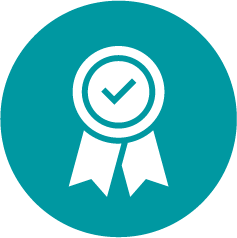
TIME magazine has published its first international university ranking, listing the 500 best universities worldwide. RWTH Aachen University has successfully positioned itself in this global comparison and is now officially one of the leading universities at the international level.
Of the more than 400 universities in Germany, only 44 made it into the ranking. RWTH Aachen University ranks 120th worldwide and an outstanding seventh in the national comparison. This result underscores RWTH’s strong position within the German and international university landscape.
The ranking is based on several indicators that reflect key performance dimensions of universities. These include scientific performance, innovative capacity, influence on the economy, and internationality. These criteria reflect essential aspects that also shape everyday university life in research and teaching.
There is a particular focus on the area of internationalization. This is measured by the number of staff and students who come to the respective university from abroad. In this category, RWTH Aachen University achieved 68.82 points, placing it 89th worldwide. Within Germany, RWTH ranks second in this area.
RWTH’s performance in the TIME magazine ranking confirms the university’s position as a high-performing and internationally oriented research location and at the same time provides a solid foundation for the further development of research, teaching, and academic exchange.
From Aachen to Singapore and back: Perspectives of a computer scientist
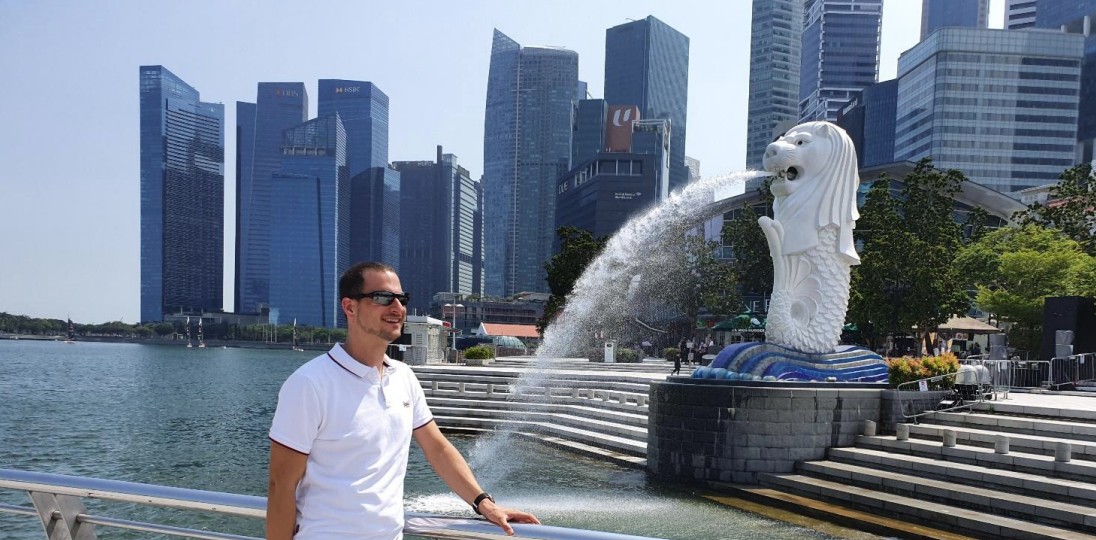
Dr Achim Lindt in front of the Merlion statue in Singapore © Achim Lindt
Dr Achim Lindt will talk about his personal and professional experiences during his five years working in Singapore as part of the RIA lecture series on Wednesday, 4 February 2026, from 5:00 p.m. to 6:30 p.m.
From 2018 to 2023, Dr. Lindt, the Business Development Manager at mgm technology partners GmbH’s Aachen branch, lived in Singapore. Based there, he was responsible for developing the business of a software platform that automates document-based business processes across much of Asia, including India, Thailand, Malaysia, Hong Kong, South Korea, Japan and Australia. During his lecture, Dr Lindt will discuss his encounters with various cultures, value systems and communication styles, and the experiences that have influenced his perspective on social norms, digitalisation and artificial intelligence.
‘Many of our graduates are drawn to the wider world. What are the differences in terms of society, private life and especially the working world? It is only once you are back that you realise many things,’ as stated in the invitation from the Faculty of Computer Science at RWTH.
The lecture will focus particularly on the effects of the pandemic, which Dr Lindt experienced in Singapore, also known as the ‘Red Dot’. Dr Lindt also reflects on his return to Germany and the skills, attitudes and perspectives he has brought back with him from his time in Asia.
The lecture will take place online via Zoom and is free to attend. A video of the lecture and subsequent discussion will be available in the YouTube playlist shortly after the event.
This event is organised in collaboration with the Faculty of Computer Science at RWTH Aachen University, Forschungszentrum Jülich, the Regional Group of the German Informatics Society (RIA), the Regional Industry Club for Computer Science Aachen (REGINA), the FH Aachen and the Aachen Group of the German University Association.
Preview: On Wednesday, 29 April 2026, Professor Johannes Erdmann from the Physics Institute A at RWTH Aachen University will give the next RIA lecture from 5:00 p.m. to 6:30 p.m. The title of the lecture is ‘Good particles, bad particles: Deep Learning as a Tool in Particle Physics’. The lecture will be available via Zoom free of charge, and a video will be made available afterwards.
To receive information about future RIA lectures, please email vortrag@i3.informatik.rwth-aachen.de.
60 years of power electronics, electric drives, and battery systems
With the founding of the Institute for Power Electronics and Electrical Drives (ISEA) in 1965, our Faculty of Electrical Engineering and Information Technology at RWTH Aachen University began a research tradition in the fields of power electronics, electrical drives, and electrochemical energy storage that continues to this day. At a time when the faculty itself was still in its infancy, ISEA laid the foundation for a close connection between basic research and industrial application.
Over six decades, a small team of around ten employees has grown into one of the most internationally renowned institutes in its field, with more than 150 employees today. For almost 30 years, ISEA has been headed by Professor Rik W. De Doncker, whose work has had a significant influence on modern power electronics in particular.
From the outset, one of the institute’s central research goals has been the development of emission-free electric drive systems. Applications for rail vehicles and the first electric vehicles were investigated at an early stage – long before electromobility became a key social issue. ISEA has made significant scientific contributions to the digital control of rotating field machines, PWM space vector modulation, and the further development of the switched reluctance machine (SRM), among other things. With the introduction of Direct Instantaneous Torque Control (DITC) in 2000, the SRM was established as a robust, cost-effective, and rare earth-free alternative in the drive sector.
ISEA also provided lasting impetus in the field of power electronics. Particularly noteworthy is the dual active bridge developed by Professor De Doncker, which is now used as a central circuit concept in numerous DC/DC converters. Its fields of application range from vehicle and industrial drives to household appliances, renewable energy systems, battery storage, and DC networks.
Since the 1970s, battery storage research has also been an integral part of the institute’s work. While the initial focus was on lead batteries, lithium-ion technology has been specifically expanded since the turn of the millennium. Germany’s largest university battery testing center was established at the Rothe Erde site, supplemented by a 5 MW storage system. Current research focuses on modeling and life cycle prediction, the development of battery management systems, industrial electrode manufacturing, and AI-supported methods for operation and analysis.
The last twenty years have also been marked by targeted structural development: new professorships, the establishment of the E.ON Energy Research Center (E.ON ERC), the Flexible Electrical Networks (FEN) research campus, and the construction of the new CARL research building, which now houses most of ISEA. The research environment is complemented by the Helmholtz Institute Münster (HI MS) under the direction of Professor Martin Winter.

photo: heroal
With excellent laboratory equipment, over 230 completed doctorates, more than 1,000 theses, and over 2,000 scientific publications, ISEA is a prime example of our faculty’s research strength and support for young scientists. After 60 years, the institute remains a key driver of scientific innovation and academic education in the field of electrical energy technology.
Coffee, pizza and the elixir of the undead
A packed auditorium and lots of curious students: the first MINT Science Slam at RWTH Aachen University was a resounding success. Over 30 schools from the region brought their upper school classes to the MINT Science Slam to gain an entertaining insight into the diversity of MINT degree programmes.
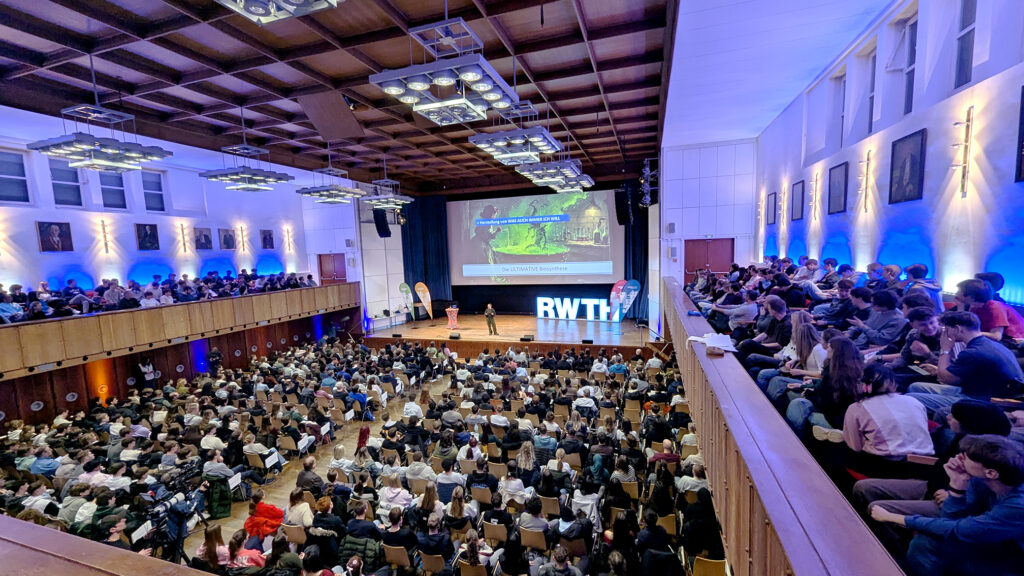
Daphne Heil und Melih Dal
The concept behind Science Slam is simple and effective: young scientists present their research topics in a clear, creative and enthusiastic manner in a maximum of ten minutes. The school pupils then evaluate the presentations themselves. This provides a lively insight into the diversity of STEM subjects, from mechanical engineering and biotechnology to medicine and electrical engineering.
Felix Walger was also there. In his slam, ‘Tailor-made medicine (technology) for everyone’, he impressively demonstrated how engineering research enables concrete social and medical applications. His presentation highlighted the central role that electrical engineering plays in the development of modern, personalised medical technology, a topic that met with great interest among the school pupils.
Alongside Walger, other young researchers took to the stage, including Rosario Othen, who won the slam with his presentation on coffee, paper and science, as well as contributions on topics such as cancer research, biotechnology, mathematics and sustainable energy. Knowledge transfer met entertainment.
The MINT Science Slam was first held as a joint project between the RWTH Knowledge Hub and the Central Student Advisory Service at RWTH Aachen University. In his welcoming speech, Professor Joost-Pieter Katoen, Vice-Rector for Teaching at RWTH, emphasised the importance of STEM subjects as key technologies for understanding our world. The slam was entertainingly moderated by Elena and Martin Lichtenthaler, supported by the Campus Dance Crew, who added to the excitement.
The STEM Science Slam impressively demonstrated how important low-threshold, inspiring formats are for study orientation and how diverse, relevant and exciting STEM research at RWTH is. For the Faculty of Electrical Engineering and Information Technology, Felix Walger’s participation was a successful example of how research, teaching and the promotion of young talent can be effectively combined.
Designing the Internet of Energy
Our electricity grids are essentially 19th-century technology. For over a hundred years, they’ve operated as a single, massive synchronized block. But today, that rigidity is a liability. Volatile wind and solar sources don’t provide the physical stability we used to get from traditional power plants, and recent events—like the 2026 cyberattack in Berlin—showed just how easily a local failure can threaten the entire system.
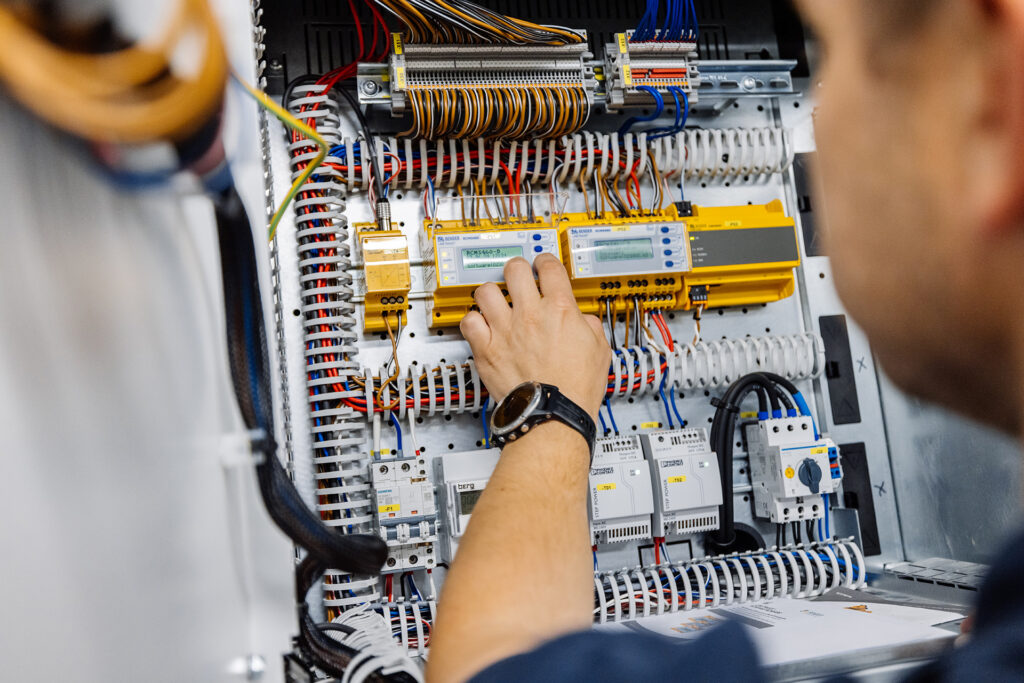
Martin Braun
To fix this, a research team from our faculty and Aalborg University just published a new approach in Nature Reviews Electrical Engineering. The work is led by Professor Antonello Monti, who heads the Institute for Automation of Complex Power Systems (ACS) at our faculty. The idea is simple: treat the grid like the internet. Instead of one giant, fragile unit, Monti’s team proposes breaking the grid into smaller, autonomous “sub-nets”. Because these parts are connected asynchronously, a fault or an attack in one area stays isolated. The rest of the network just keeps running.
This is the core of the SAFEr Grid project, an ERC Synergy Grant initiative coordinated by RWTH. We aren’t talking about a massive, overnight construction project. It’s a long-term evolution to build a grid that handles renewables by design and is tough enough to stop a local glitch from becoming a regional disaster.
Beyond 5G: Bringing 6G to the Factory Floor
Starting in January 2026, the project “6GEM+: Value-oriented 6G Communication Systems for the Networked Digital Industry” has officially launched. Led by Professor Haris Gačanin, who holds the Chair for Distributed Signal Processing at our faculty, this initiative marks the transition from pure research to practical industrial transfer.
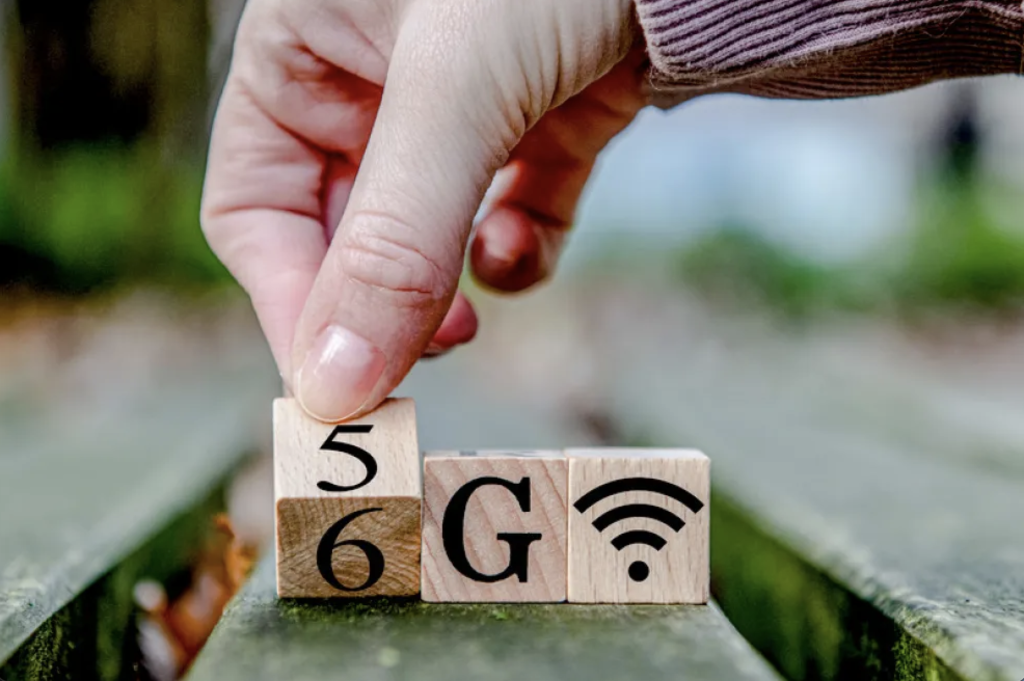
RUB, Marquard
While 5G laid the groundwork for mobile connectivity, it faces limitations in demanding industrial environments. Current systems often struggle with integrated AI computing, real-time data transmission, and the ultra-low latency required for advanced robotics. The 6GEM+ Transfer Hub is designed to overcome these barriers, ensuring that the next generation of networks can support fully autonomous logistics and AI-driven production.
Supported by 25 million euros in funding from the Federal Ministry of Research, Technology, and Space (BMFTR), the project will run for four years. It brings together a powerful consortium including TU Dortmund, Ruhr-Universität Bochum, and the Fraunhofer Institutes for Production Technology (IPT) and Material Flow and Logistics (IML). A key element of this project is the involvement of industrial “use-case mentors” who provide real-world insights to ensure that the developed technologies are not just innovative, but ready for the factory floor.
Picture Coding Symposium 2025: Global Video Coding Experts at RWTH Aachen
Aachen became the global hub for image and video coding this December. For the first time, the renowned Picture Coding Symposium (PCS) was held at RWTH Aachen. Led by Professor Mathias Wien and Professor Jörn Ostermann, 162 participants from 19 countries gathered at the SuperC to share cutting-edge research.
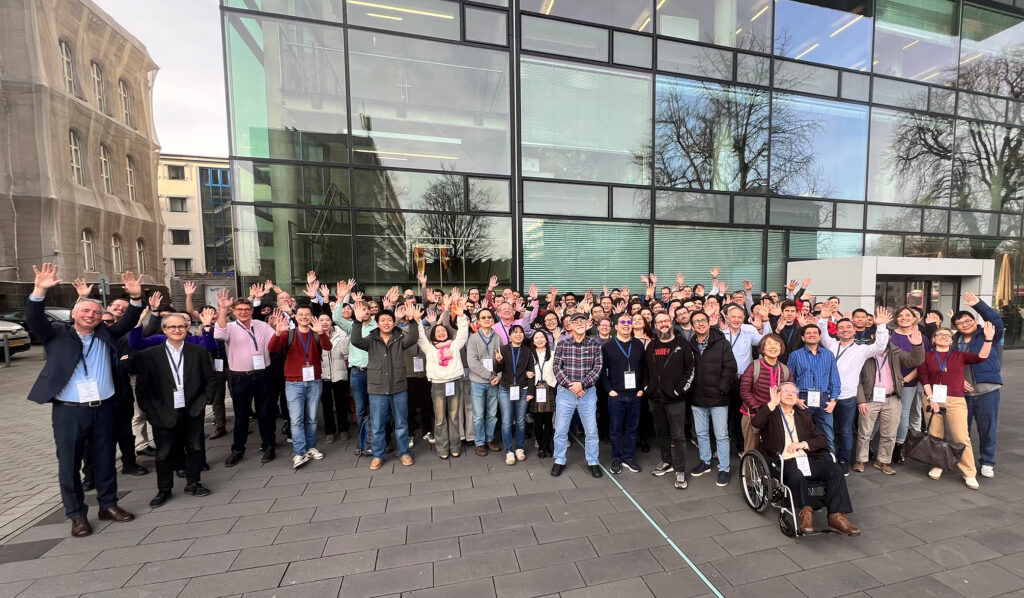
Foto: Mirco Seidler
A Tribute to Professor Jens-Rainer Ohm A major highlight was the honoring of Professor Jens-Rainer Ohm, former head of the Institute for Communications Engineering. His work on global standards like AVC, HEVC, and VVC is the foundation for video transmission on nearly every modern television and mobile phone.
The interactive atmosphere promoted the exchange of knowledge and ideas between international researchers from both academia and industry. The organizers were pleased with the positive feedback and emphasized the importance of such events for scientific progress and international cooperation.
RWTH Electrical Engineering Ranks 8th in Europe
Our Faculty of Electrical Engineering and Information Technology continues to set benchmarks for excellence. In the latest EngiRank 2025, RWTH Aachen secured the 7th position among 239 technical universities in Europe, with our department leading the way:
Top 10 in Europe: Our Electrical Engineering program is officially ranked 8th across the entire continent.
Excellence in Scores: Achieving 91.91 out of 100 possible points, RWTH has shown steady improvement and maintains its position as the #2 technical university in Germany.
Driven by Innovation: The ranking highlights our outstanding performance in research, internationalization, and the number of patents filed.
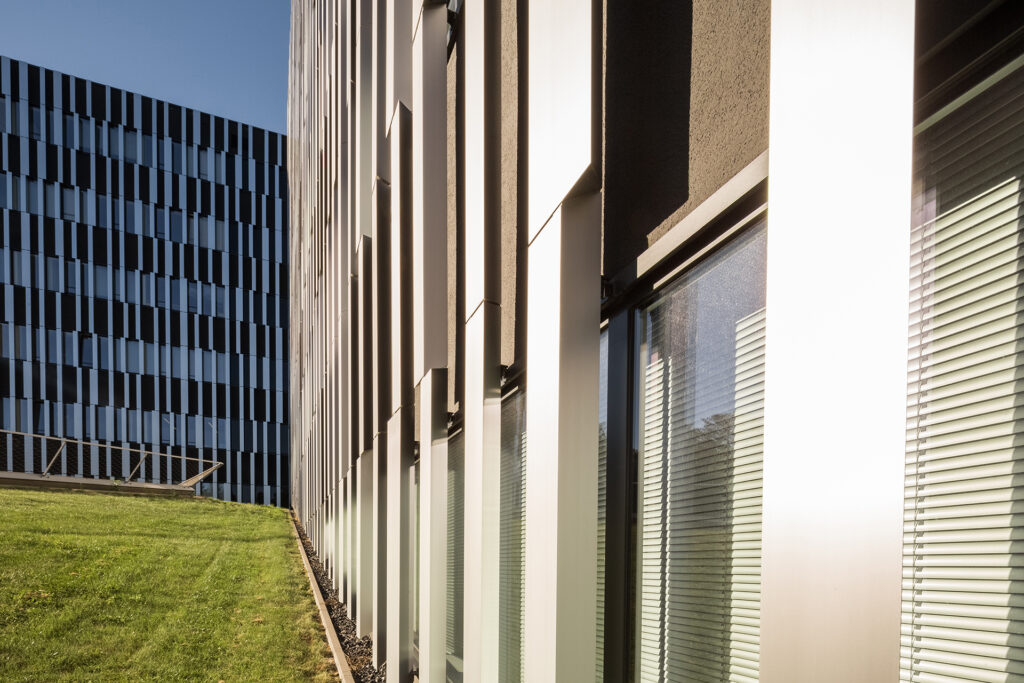
Martin Braun
This ranking reinforces our faculty’s reputation as a global leader in technology and innovation. To our students and staff: thank you for making us one of Europe’s elite engineering institutions!
Three outstanding theses from our faculty awarded the Friedrich Wilhelm Prize 2025
At the Friedrich Wilhelm Prize award ceremony on Friday, a total of 17 students and doctoral candidates from RWTH Aachen University were honoured for their outstanding scientific work. Among them were three award winners from the Faculty of Electrical Engineering and Information Technology.
The award winners from our faculty were Jonas Timon Schroeder, M.Sc., for his master’s thesis (supervised by Prof. Monti), Dr.-Ing. David Wasylowski for his dissertation (supervised by Prof. Sauer) and Dr.-Ing. Felix Jiang for his dissertation (supervised by Prof. Ingebrandt). The prizes were presented by RWTH Rector Ulrich Rüdiger in the auditorium of the main building; with musical accompaniment provided by the RWTH Big Band.
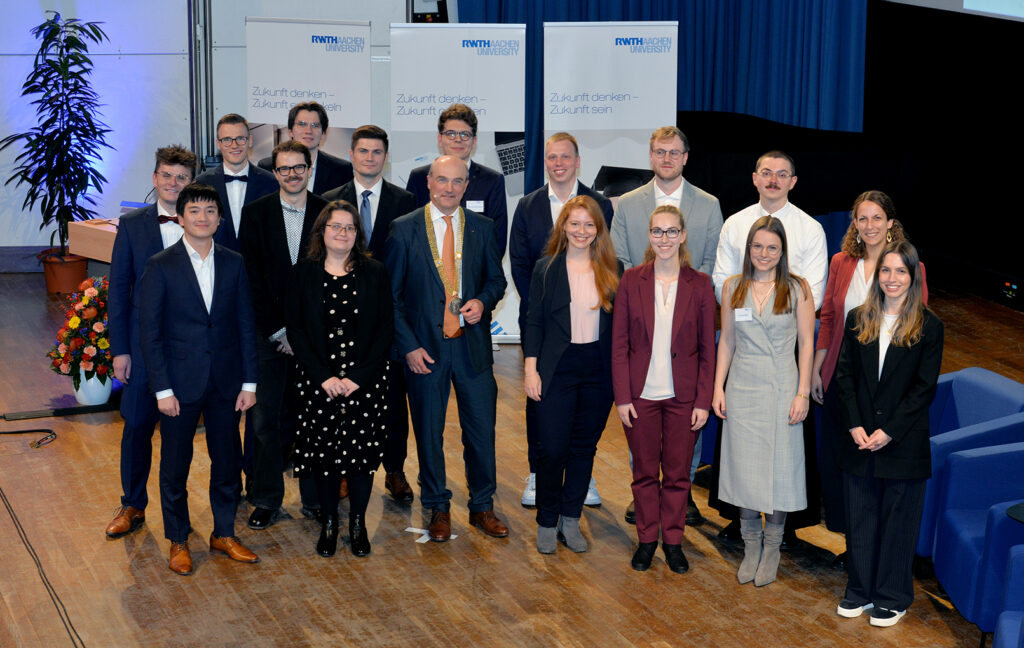
Photo: Andreas Schmitter
The Friedrich Wilhelm Prize is awarded by the Friedrich Wilhelm Foundation, which was established in 1865 by the legal predecessor of today’s Aachener und Münchener Beteiligungsgesellschaft. Its main focus is to promote research and teaching and to support students and scientists at RWTH Aachen University. The foundation is named after Friedrich Wilhelm III, Crown Prince of Prussia and later Emperor. In 1858, he received a donation of 5,000 talers to establish a polytechnic institute in the Rhine Province. This donation formed the basis for the later Friedrich Wilhelm Foundation and thus for the development of RWTH Aachen University.
The award-winning theses impressively demonstrate the scientific breadth and capabilities of our faculty. The award winners represent key areas of modern electrical engineering and contribute to the visibility and strength of our research with their outstanding theses. The faculty warmly congratulates Mr Schroeder, Dr Wasylowski and Dr Jiang on this significant award.



